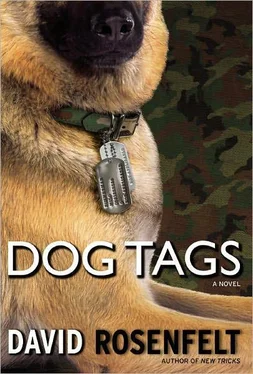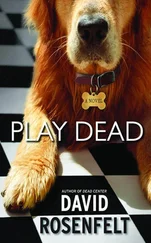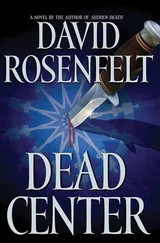“I need a favor” is the first thing Pete says to me.
“Dream on,” I say, though we both know that I will do whatever he asks. Since I am a criminal defense attorney, Pete’s job as a police lieutenant makes him a valuable source of information for me, and I call upon him all the time. He grumbles, but he always comes through.
Even if that weren’t the case, I would do whatever Pete needs. Doing favors fits squarely within our definition of friendship, and to refuse one would be highly unusual. But pretending to resist is a necessary part of the process.
“Actually, I’m doing you a favor,” he says. “I’ve got you a client.”
“Just what I need,” I say. I am independently wealthy, a result of inheritance and a few major victorious cases. Since hard work in general, and hard legal work in particular, is not my idea of a good time, I rarely take on new clients.
“You read about the murder in Edgewater last night?” Pete asks.
“Was it on the sports page?”
Vince chimes in with “You’re an asshole.” I can’t decide if he says that because it was on the front page of his newspaper and he’s annoyed that I didn’t see it, or because he just thinks I’m an asshole and thought this was a good time to remind me. Probably both.
“I read about it,” I say.
“The guy they arrested for it is Billy Zimmerman. We graduated from the academy together, and we were even partners for a while.”
“An ex-cop?” I ask, and immediately regret the question.
“Wow, you figured that out all by yourself?” Pete asks. “Just from what I said about him going to the academy and being my partner? You are really sharp.”
“Get to the favor part,” I say.
“All in good time. Anyway, Billy was also in the National Guard, and he volunteered to go to Iraq. He was there less than a year and got his leg blown off. So he comes back and gets screwed by everybody. Medical care is bad; it was like they were doing him a favor by treating him. And all he could do on the force was get a desk job, which is not for Billy. So he told them to shove it.”
“What did he want?”
“He wanted his old job back, working the streets.”
“With one leg?”
“He has a prosthetic; it works fine,” Pete says. “He could outrun you.”
“So can my grandmother,” Vince says.
“Both your grandmothers are dead,” I say.
He nods. “Either one of them could still spot you ten yards in the hundred and wipe the track with you.”
I’m not going to get anywhere by talking to Vince, so I turn my attention back to Pete. “So he wants me to represent him?” I ask, cringing.
“Maybe. We didn’t talk about it,” Pete says. “But that’s down the road.”
The answer surprises me. “What’s up the road?”
“His dog.”
“He wants me to take his dog?” I ask, my relief probably showing through. Willie and I have already placed hundreds of dogs through our foundation, and adding one is no hardship at all.
“No. He wants you to defend his dog.”
“From what?”
“The government.”
CHAPTER 7
“HE’S LIKE A CELEBRITY HERE, ANDY.”
Fred Brandenberger is talking about Milo, who has been placed in the Passaic County Animal Shelter. Fred is the shelter director, a thankless job in a world in which there are far more dogs and cats than available homes.
I am following through on Pete’s request for me to try to help his friend by helping his friend’s dog. The first step in that process is to visit with my new “client,” whom Fred tells me is occupying a special dog run in the back of the shelter.
“What do you mean by ‘celebrity’?” I ask.
“Well, for one thing, four cops came with animal control when they brought him in. Then they told me I couldn’t take him out, not even for a walk.”
It hits me that it’s probably the dog I saw under police siege the other night. “Is it a German shepherd?” I ask.
“How did you know?”
“I was there when the arrest went down. But you can do whatever you want with him,” I say. “This is your show here.”
“I don’t think so,” he says. “You’ll see what I mean in a second.”
Fred brings me into a back room that I’ve never been in before, and which I didn’t realize existed. The room is completely empty except for a large dog run against the back wall. In that run is the same German shepherd, pacing in his five-by-eight space, as if frustrated and not completely understanding or tolerating the fact that he is a prisoner. When they say that someone is acting like a caged animal, this is literally what they’re talking about.
I’ve got a thing about dogs; I am totally and completely crazy about them. I thumb through Dog Fancy the way most guys look at the Sports Illustrated swimsuit issue. And this dog is even more spectacular than he looked in the dark the other night; there is immediately no doubt that he does not belong in these circumstances, and I am going to change them.
He is getting out.
Sitting on a chair in front of the run, and complicating matters considerably, is a uniformed police officer. He stands when he sees us, and lets his hand rest on his holstered gun.
“What’s going on?” he asks.
“What are you doing?” I ask. “Guarding the dog?”
“Who are you?”
We seem to be asking a lot of questions, but none of them are getting answered. I decide to break that streak. “I’m the dog’s lawyer.”
“What the hell are you talking about?”
“Which part didn’t you understand? I’m Milo’s lawyer, and I’m here to discuss the case with my client. If you’ll excuse us…”
“Forget it,” he says. “Nobody gets near that dog.”
“Except for me,” Fred offers. “I get to feed him and clean up after him.”
“Why are you guarding my client?”
“Because they assigned me here,” the officer says. “You think I decided to do this on my own?”
This isn’t turning into a very productive conversation. “Why did they assign you here?”
He shrugs. “Beats the shit out of me. But nobody’s going near that dog.” He nods toward Fred. “Except this guy.”
I’m not going to get anywhere with him, and I sort of have nowhere to get anyway. It’s not like I was going to have a meaningful client conference with Milo; I just wanted to get another look at him. He’s a spectaular, powerful dog who certainly doesn’t look like he needs an armed guard to protect him. It annoys me to see him locked up like this.
“Okay,” I say, and then look past him so I can talk directly to Milo. “Milo, don’t talk to anybody about anything. Anybody asks you something, refer them to your lawyer. If you need anything, cigarettes, reading material, whatever, just tell the guard.”
The officer looks like he’s going to shoot me, so Fred and I go back into the main area. “You have no idea what this is about?” I ask.
“Nope. They came in like they were dealing with Al Capone and wouldn’t tell me anything. But there’s a guard there twenty-four hours; maybe they think somebody is going to try to steal him. Stealing dogs is not usually a problem here.”
Fred is referring to the fact that he frequently has the very unpleasant task of having to put down some of the dogs here. It’s why Willie and I have our foundation.
I call Pete from my car and tell him what happened, and I’m surprised when he doesn’t sound surprised at all. “Yeah, I was going to call you,” he says. “I just heard about the guard.”
“What’s this all about?”
“I don’t know, but the situation is locked down. And the word is that the FBI is involved.”
“FBI? Who did your friend kill?”
Читать дальше












